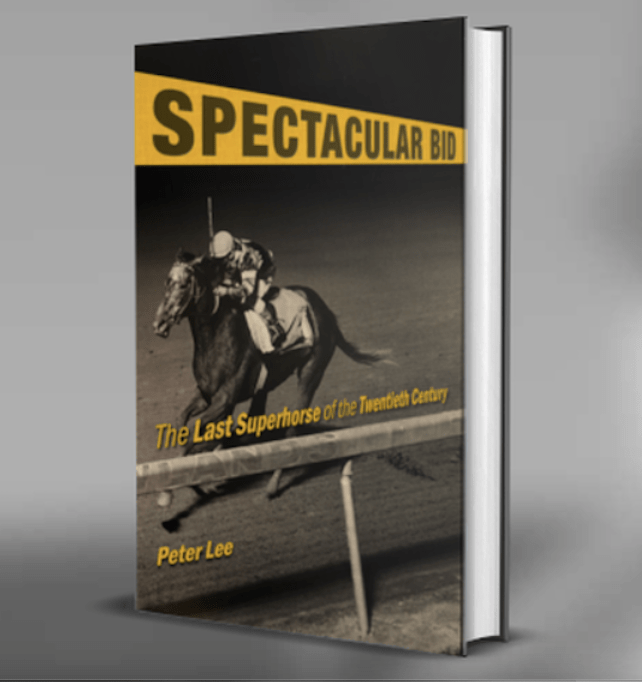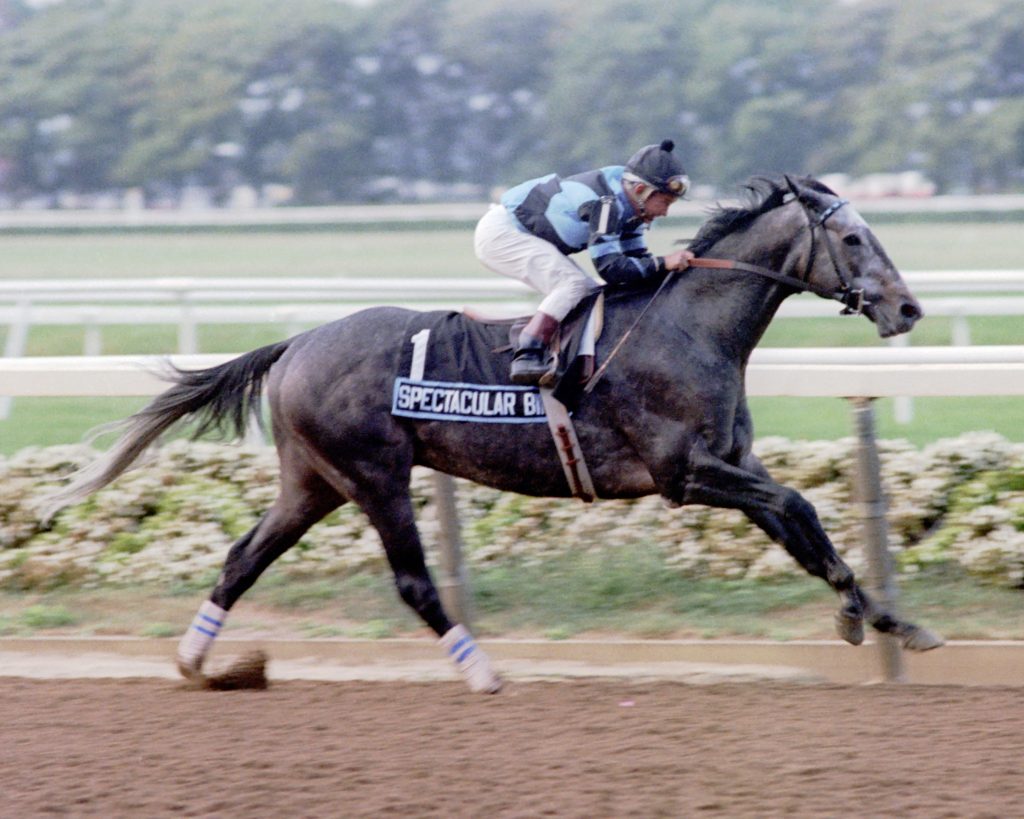
Next up on Past The Wire’s “Author’s Corner” is Peter Lee’s fabulous book about Hall of Famer Spectacular Bid. The Bid won two-thirds of the Triple Crown in 1979 before he got a safety pin embedded in his hoof the morning of the Belmont Stakes which resulted in one of the most dramatic Belmont finishes in history. Enjoy the read!
By Peter Lee
When you ask sports lovers who the great racehorses from the 1970s were, they’ll probably mention three, maybe four horses: the pure power and dominance of Secretariat, the undefeated Triple Crown campaign of Seattle Slew and the unforgettable duels between Affirmed and Alydar.
One horse often forgotten is Spectacular Bid.
Perhaps it’s because his career ran into the 1980s, but it’s most likely because he failed in his bid to win the 1979 Triple Crown. He won the first two legs with relative ease, but a bad ride by his jockey, Ronnie Franklin, coupled with an injury from a safety pin (and yes, there was a safety pin), caused him to finish third in the Belmont Stakes. He did not become the 12th Triple Crown winner.
Most fans, disappointed in the result, quickly forgot about the Bid. And his loss was the beginning of a painful and frustrating Triple Crown drought: It was 37 years before fans saw another horse win all three races.
But are we too quick to dismiss Spectacular Bid? The answer is a resounding yes. I’ll go so far as to say he belongs near the top of the list of the greatest horses of all time. Here’s why.
The Record
Spectacular Bid, a battleship gray horse who was the offspring of Spectacular and Bold Bidder, ran at ages 2, 3 and 4 and started a total of 30 races—unheard of for a horse today, who may run only a fourth as many races. (The 2018 Triple Crown winner, Justify, retired after only six races.)
Of those 30 races, he won 26 of them, with two seconds, a third and a fourth. That’s a winning percentage of 86.6%, better than Affirmed, Dr. Fager, Count Fleet and even Secretariat, who won only 76.1% of his races. He had winning streaks of 12 and 10 races in a row, the latter streak stopped only by retirement. By comparison, Secretariat’s longest streak was five.
Two of Spectacular Bid’s losses came when he was 2 and still learning how to race. At 3 and 4 years old, he won 19 of 21 races. He was undefeated in nine races at 4 and was named 1980’s Horse of the Year.
During his career, he traveled over 10,000 miles to 15 different racetracks from coast to coast, winning at every one of them. He broke seven track records and equaled another.
The Strub Stakes
And then there was the Strub.
On February 3, 1980, carrying the highest weight in the field, Spectacular Bid beat his rival Flying Paster by 3 1/4 lengths, setting a world record of 1:57 ⅘. It has yet to be equaled on dirt, lasting over four decades. Let’s put that in perspective:
• Secretariat, who holds the Kentucky Derby record for the same distance and was at an equal weight, would have lost by eight lengths to Spectacular Bid if he had run the same speed as he did in the Derby.
• Bid’s record is the sixth-oldest world record still standing. Two of those records are for distances longer than 1 ½ miles, which are rarely run anymore.
• Since 1946, only 11 horses have won 1 1/4-mile stakes races in 1:58 3/5 or faster. Only one has done it in the last 15 years.
• Flying Paster’s second-place finish would have set a track record, and he still lost by over three lengths.
The Woodward

The Walkover (Photo by Bob Coglianese)
By the time Bid’s career was ending, no owner wanted to race their horse against him. For the 1980 Woodward Stakes, only two other horses dared to challenge him—Temperance Hill, winner of the 1980 Belmont Stakes and Travers Stakes, and sprinter Dr. Patches. But both were scratched.
This meant that Bid would run the Woodward by himself—the first walkover since 1949 when Coaltown had gone to the starting gate alone at Havre de Grace. Brian Landman of the Tampa Bay Times wrote that a walkover was “racing’s greatest gesture of respect.”
It was no training run for Bid; Jockey Bill Shoemaker had to restrain him to prevent him from wasting too much energy. Still, he galloped the 1 ¼ miles in an impressive 2:02 2/5—the same time in which he had finished the Kentucky Derby.
Adulation from the experts
Sure, this is subjective, but it shows what class others have put Spectacular Bid. In their book, A Century of Champions, authors John Randall and Tony Morris placed Bid ninth in the world according to Equibase speed figures dating back over 100 years. He was third in the American rankings behind Secretariat and Citation.
In 2005, the Louisville Courier-Journal ran a fantasy story consisting of Derby winners throughout history, and the sports writers picked Spectacular Bid to win over Citation, with Secretariat finishing third.
And finally, former Washington Post columnist Andrew Beyer said, “I think Spectacular Bid could reasonably be rated as a close No. 2 on the all-time list after Secretariat, and he deserves extra credit for his great consistency.”
Consistency is a characteristic of a superhorse, and his longevity and feats on the track (as well as a comeback from a potentially career-ending injury) put him fourth on my list of greatest racehorses behind Secretariat, Man O’War and Dr. Fager.
I also consider him the last superhorse we’ve seen in North America (with apologies to Cigar and American Pharoah). He is, without a doubt, a champion that deserves mention among the all-time greats.
_________________________
Peter Lee is the author of Spectacular Bid: The Last Superhorse of the Twentieth Century, published by the University Press of Kentucky. You can purchase the book at Amazon or most online and brick-and-mortar booksellers.



